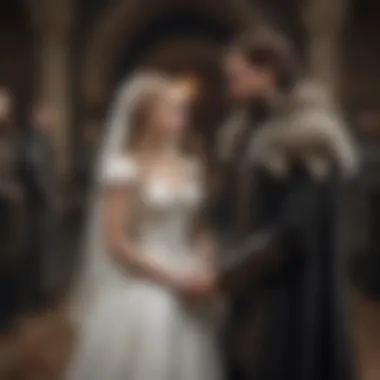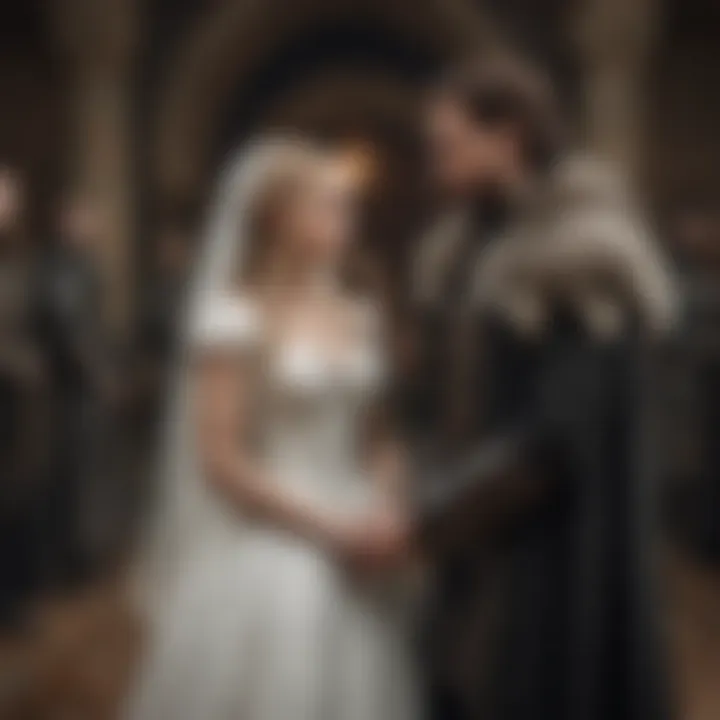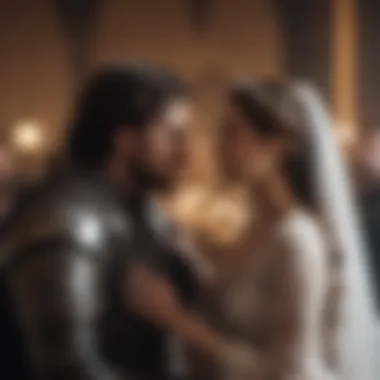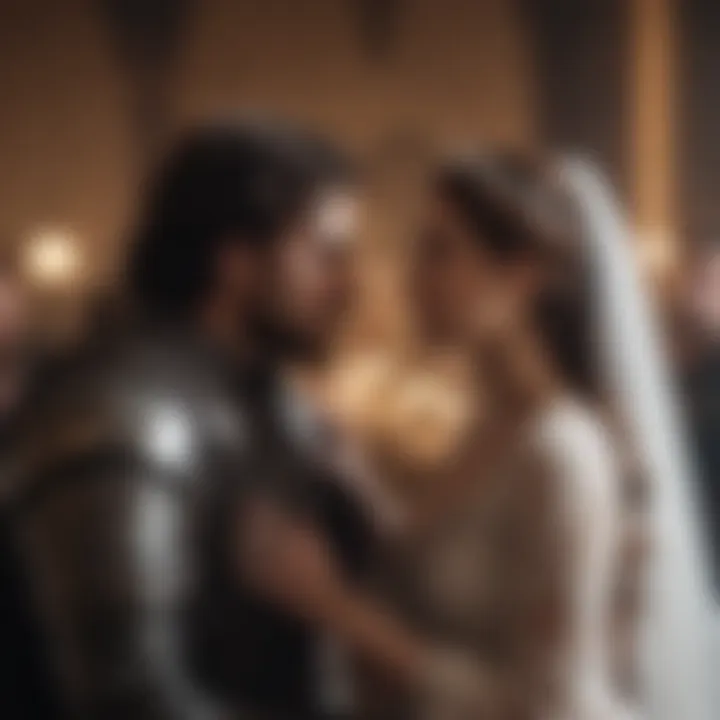Exploring Marriages in Westeros: Power and Politics


Intro
Marriages in Westeros are more than mere unions of love; they are strategic political moves influencing the fate of kingdoms. In the world of Game of Thrones, every wedding carries significant weight, often leading to dramatic upheavals or consolidations of power. This article examines these marriages deeply, exploring the motivations that drive characters to wed and the implications of these unions on the broader political landscape and character arcs.
The exploration includes not just who gets married, but why these unions are essential to the story. Each marriage is a lens through which themes of loyalty, ambition, and power dynamics can be interpreted. By tracing the genealogy of key families in Westeros, readers will understand the mesh of alliances, betrayals, and rising ambitions that dictate the events in this fictional realm.
The following sections will delve into key marriages, dissect character motivations, illustrate how these unions shape plot developments, and consider cultural aspects surrounding these events. As we journey through the nuptials of Westeros, we will uncover the intricate connections between personal relationships and the machinations of power.
Character Dissections
Detailed Analysis of Key Characters in Game of Thrones
Weddings in Game of Thrones often communicate character intentions, ambitions, and deeper traits. Let's take a look at some of the pivotal figures whose marital choices shape their narratives:
- Cersei Lannister: Throughout the series, Cersei's marriages illustrate her strong desire for power. Her marriage to King Robert Baratheon serves as a crucial link in the political intrigue, despite her love for her brother Jaime. Later, her manipulations become clearer as she marries Loras Tyrell for political gain, which further impacts her position in the court.
- Robb Stark: Robb’s choice to marry Talisa Maegyr, driven by love, contrasts with the expected political union with one of the Frey daughters. This pivotal decision leads to dire consequences during the infamous Red Wedding, showcasing how personal desires can clash with political necessities.
- Daenerys Targaryen: Daenerys's multiple marriage attempts reveal her evolving character as she seeks to reclaim her family's throne. Her marriage to Khal Drogo marks her transformation from a timid girl to a strong leader, embodying the duality of love and power.
Character Development Throughout the Series
The marriages of these characters not only define individual arcs but also serve as reflections of the power dynamics in Westeros. For example:
- Cersei starts off as a queen consort whose motivations are cloaked in avarice and manipulation. Her evolution into a ruthless queen highlights the toll that the quest for power can take.
- Daenerys goes from a subservient bride to the Mother of Dragons, showcasing her growth and the significance of her marital alliances in her quest for sovereignty.
Impact on the Overarching Storyline
Each marriage significantly influences plot direction. They alter allegiances, spark conflicts, and ultimately, shape the fundamental outcomes of the series.
"Marriages in Westeros often serve a greater purpose than love; they are coded messages in the political intrigue that define the realm."
In sum, the character dissections reveal that the alliances formed through marriage in Westeros are complex and multi-faceted. They evolve as characters develop, and examine the greater context of familial loyalty and betrayal, laying the groundwork for larger themes that resonate through the series.
Episode Breakdowns
In understanding the significance of these unions, examining specific episodes provides insight into how marriages affect pivotal story events and character fates. The tension surrounding a wedding often encapsulates the story's broader conflicts, revealing the stakes inherent in these unions.
Intro to Marital Alliances in Westeros
Marriages in Westeros serve as more than simple unions; they are critical to the political and social framework of the realm. This article explores how these marriages shape alliances, influence power dynamics, and affect character arcs in the world of Game of Thrones. Understanding marital alliances uplifts the broader narrative, giving readers insight into how relationships forge destinies and secure ambitions within the Seven Kingdoms.
Understanding the Concept of Marriage
Marriage in Westeros is not merely a romantic pact. It is often orchestrated with calculated precision, prioritizing alliances over affection. Families seek to strengthen their positions, gain control over resources, or solidify power through marriage ties. For example, the union between House Targaryen and House Baratheon was more than just a joining of two houses; it marked a key moment in establishing the Targaryen rule over Westeros.
A marriage can be a matter of survival, especially in a world as treacherous as Westeros. Individuals navigate a landscape filled with betrayal, ambition, and the quest for power. Marriage becomes a strategy that can determine life or death, making it crucial for both personal and political standing. In this regard, marriages are treated as tools within a larger game of thrones, highlighting the often harsh realities faced by those within the nobility.
The Role of Marriage in Political Strategy
In Game of Thrones, marriage embodies a political strategy deeply ingrained within the culture of Westeros. It is not just about forming a bond but rather a means through which houses can assert dominance and control. The marriages of key players, such as Cersei Lannister to King Robert Baratheon, illustrate how political alliances can lead to power shifts. Each family considers the implications of a union, analyzing potential benefits and risks to their standing.
Political marriages often dictate the trajectory of conflicts and alliances, influencing everything from military support to territorial expansion.


Moreover, marriage can serve as a catalyst for war or peace. The nuptial agreements between rival families can either forge strong alliances or deepen animosities, as seen with the Stark and Lannister unions. There are layers of strategy involved, and the ripple effect of any marriage decision often extends beyond the immediate participants. Understanding these nuances reveals how integral marriage is to the narrative of power struggles in Westeros.
By exploring these dimensions, one can truly appreciate the depth of marital alliances in the series, showcasing how interpersonal relationships intersect with broader themes of power, loyalty, and ambition.
Key Marriages of the Seven Kingdoms
The marriages among the prominent houses in Westeros serve as critical turning points in the series. These unions are not only about love but also strategic alliances that can reshape the political landscape. Such marriages often reflect the tenuous balance of power in the realm, revealing motivations rooted in ambition, loyalty, and survival. Understanding these marriages helps to contextualize the conflicts that unfold throughout the series. The significance of these alliances goes beyond the nuptials themselves; they set the stage for characters' trajectories and broader themes such as betrayal and the quest for the Iron Throne.
The Union of House Stark and House Tully
The marriage between Catelyn Stark and Eddard Stark serves as a pivotal moment in the narrative. This union signifies a vital alliance between the North and the Riverlands. The Stark family is rooted in their sense of honor, while the Tullys are known for their emphasis on family ties. This marriage reinforces the principle of loyalty, evident in Catelyn's actions throughout the story. Catelyn's commitment often clashes with Eddard's honor, leading to significant plot developments. Their children become key figures, embodying the themes of loyalty and consequence.
Marriage of House Lannister and House Baratheon
The alliance between Cersei Lannister and King Robert Baratheon is a classic example of political maneuvering. This marriage is not born from love; rather, it is a calculated move to solidify Robert's claim to power. Cersei, as a member of House Lannister, brings the wealth and influence of her family to the partnership. This union holds great importance for both houses, intertwining their fates and influencing the subsequent conflicts. Tension rises as we see how the marriage is riddled with infidelity, betrayal, and ambition. Cersei's desire for power clashes with Robert's own shortcomings, leading to devastating consequences for both the Lannisters and Baratheons.
The Targaryen Marriages: Love and Power
House Targaryen is characterized by its complex marriages, often merging love with the pursuit of power. The wedlock between Aerys II Targaryen, known as the Mad King, and his sister Rhaella underscores the Targaryen tradition of keeping bloodlines pure. However, this practice also leads to madness and moral degradation. Additionally, the marriage of Daenerys Targaryen to Khal Drogo illustrates a different dynamic. This alliance, though initially born from necessity, transforms into a powerful bond that shapes Daenerys's character and ambitions. The juxtaposition of love and power in these unions presents the Targaryens' significant influence on the realm.
House Tully's Marriages: A Web of Alliances
The Tullys are central in creating alliances through marriage. Edmure Tully's wedding to Roslin Frey exemplifies this strategic approach. This union aims to align House Frey with House Tully, demonstrating the importance of marital alliances in maintaining peace between factions. However, the Tullys' choices often lead to unforeseen consequences, showcasing the complexity of such alliances in a world rife with ambition. Individual marriages weave a web that connects various houses, and these connections are fraught with tension and intrigue, affecting the realm's overall dynamics.
"Marriage in Westeros is rarely about love; it is a contract laden with power and strategy."
The key marriages of the Seven Kingdoms serve as the backbone of social and political structures in Westeros. They demonstrate how love and duty often collide, changing the destinies of characters and houses alike.
Notable Weddings and Their Significance
Marriages in Westeros play crucial roles beyond mere ceremonial unions. They serve as pivotal moments with long-lasting impacts on the political landscape and the lives of characters. The weddings discussed in this article highlight the intricate dance of power, allegiance, and often betrayal that defines relationships in this realm. Each wedding encapsulates not only personal stories but also broader themes such as ambition and the quest for power, revealing how the characters navigate complex social hierarchies.
The Wedding of Edmure Tully and Roslin Frey
Impact on House Stark
The marriage between Edmure Tully and Roslin Frey was initially framed as a strategic alliance aimed at uniting the Tullys and the Freys. However, its consequences reached far beyond mere politics. This union had direct implications for House Stark, as it was hoped to strengthen ties between the North and the Riverlands, traditionally seen as reluctant allies.
The significance of this union was palpable in how it aimed to bring peace and stability during a tumultuous period. What made this marriage particularly interesting is the unique position House Stark found itself in; it was trying to foster vital alliances, hoping the Tullys could sway the Freys towards their cause. This reliance on Edmure's marriage highlights the precarities of their political situation.
Frey’s Role in the War of the Five Kings
The Freys, once a minor house, gained prominence through clever political maneuvers. The marriage of Edmure Tully to Roslin Frey was meant to solidify their significance during the War of the Five Kings. However, as history reveals, the Freys' role was not just about alliance-making. Their actions had complex and far-reaching consequences.
The choice of alliance with the Freys brought both benefits and challenges. The Freys, while attempting to elevate their status, also became pivotal in shaping the war's dynamics. Their half-hearted loyalty and ultimate betrayal at the Red Wedding expose the frailty of such alliances, emphasizing the balance of power constantly shifting within Westeros.
Joffrey Baratheon and Margaery Tyrell
Political Maneuvering
The marriage between Joffrey Baratheon and Margaery Tyrell is steeped in the realm of political chess. It was orchestrated to consolidate power, bringing together the ruthless Baratheons and the resourceful Tyrells.


This union showcased how marriages were often used as tools for advancement. The negotiation process itself highlighted a delicate balance of manipulation and coercion. The union was perceived strategically; however, it ultimately served different factions and led to a series of betrayals and conflicts. The marriage represented a fraught partnership entrenched in power struggles.
Public Perception and Propaganda
The relationship between Joffrey and Margaery also reveals the role of public perception. The Tyrells understood the importance of shaping narratives. Their efforts to present a loving portrait helped enhance their social standing. Margaery’s charm and strategy turned public sentiment in her favor, showcasing how marriages could be leveraged for propaganda.
While it might seem advantageous to cultivate such perception, it also created unrealistic expectations that inevitably led to discontent. The manipulation of public opinion through this marriage set the stage for further intrigues within the capital's turbulent landscape.
The Red Wedding
Consequences for the Starks
The infamous Red Wedding stands out as one of the most shocking events in the saga of Westeros. It was an alarming twist of fate for House Stark, whose trusted alliance crumbled amid treachery. The massacre not only resulted in loss of lives but also dismantled the Starks’ influence in the realm.
The aftermath marked a brutal turning point; the Starks were left vulnerable, and their loss signaled the decline of their honor and power. This event shocked the audience, possessing a lasting impact on Westeros and its inhabitants. The Red Wedding illustrates how a single marriage can reverberate through history.
Shifts in Power Dynamics
The repercussions of the Red Wedding were not limited to the Stark family alone. It changed the political landscape of Westeros significantly. With the death of key characters, new power vacuums emerged, leaving rival houses scrambling to fill those roles.
The event exemplified the drastic and often violent shifts in alliances. It marked the rise of the Freys, who seized newfound power, while concurrently detailing the fall of the Starks. This sudden alteration in power dynamics visually represents the precariousness of alliances in Westeros, leading to constant fluctuations in loyalty and strength across the Seven Kingdoms.
Marriages Beyond the Main Houses
In Westeros, marriages are not only limited to the major houses. The unions formed between lesser-known houses often have far-reaching consequences. These marriages offer deep insights into the cultural, political, and social fabric of the realm. While the unions of great houses attract much attention, it is the lesser marriages that sometimes shift alliances and alter power dynamics subtly. Understanding these marriages is essential to grasping the full scope of political maneuvering in Westeros.
Dorne's Unique Approach to Marriage
Dorne stands apart regarding marriage customs. The region is known for its distinct cultural norms, which promote individual choice and emphasize gender equality. Marriages in Dorne do not always serve political ends. Often, passion and love play significant roles in decision-making. This approach can present both opportunities and challenges in the political landscape of Westeros.
Prominent Marriages in Dorne
Prominent marriages in Dorne showcase the region’s values. One such marriage includes that of Oberyn Martell and his partner. This union exemplifies the interplay between romance and duty. The key characteristic of many Dornish marriages is their fluidity. Couples often choose partners without strict adherence to political alliances. This beneficial characteristic allows for unique unions that foster strong relationships and familial bonds, which can be crucial in times of conflict.
The unique feature of these unions is the emphasis on mutual consent. This can lead to more stable households where support is shared. However, the disadvantage is that this openness can sometimes weaken alliances, making them less predictable for outside forces.
Political Implications of Martell Unions
The Martell family, through their marriages, often extends influence beyond Dorne. Marriages like that of Prince Doran Martell are carefully strategized to align with their broader goals. The key characteristic of Martell unions is their strategic intent behind each marriage decision. Marrying into other houses can create necessary alliances and is a popular choice for ensuring mutual support during political strife.
One unique feature is the ability to maintain distinct cultural values while engaging in political marriages. This can be advantageous by securing allies without sacrificing identity. Yet, a disadvantage could be misunderstanding or neglect from other houses that see only the surface of these relationships, potentially leading to exploitation or conflict.
The Unconventional Marriage of Daenerys Targaryen
The marriages of Daenerys Targaryen symbolize both personal ambition and political strategy. Daenerys’s experiences underscore the complexities of marriage as a political tool. Her key unions reflect both her quest for power and personal development in a patriarchal society.
Strategic Alliances
Daenerys’s marriages, particularly to Khal Drogo, illustrate a form of strategic alliance that transcends traditional expectations. The key characteristic of this union is its initial lack of emotional connection, emphasizing the political agenda at play. This aspect makes it a beneficial union; the alliance with the Dothraki strengthens her claim to power.
A unique feature of these alliances is that they often lead to unexpected benefits. By marrying into different cultures, Daenerys gains their loyalty and support. However, such unions can also lead to disadvantages, as emotional distance can create challenges in leadership and loyalty.


Personal Sacrifices
Personal sacrifices define Daenerys's journey through her marriages. Each union demands something of her, shaping her identity and leadership style. The key characteristic of these sacrifices is the extent to which they alter her character arc. This perspective adds depth to her narrative, making it a popular exploration of marriage dynamics in Westeros.
A unique feature here is the profound effect of these sacrifices on her decisions. Conflicting loyalties often arise as she navigates her path, resulting in isolating experiences. The advantage is that these challenges enhance her character's complexity. Conversely, they also highlight vulnerabilities that can be exploited by her enemies.
"Marriages beyond the main houses provide a lens through which we can view the intricate web of loyalties and ambitions in Westeros. The beauty lies not only in the alliances formed but in the human experiences that color these unions."
Ultimately, the marriages beyond the main houses engage viewers in a deeper understanding of the intricate and often precarious nature of political relationships in Westeros. They reveal how connections, both personal and political, shape events throughout the realm.
Cultural and Societal Views on Marriage in Westeros
Marriage in Westeros is not just a union of two individuals; it is rather a complex social contract with deep political and cultural implications. Each marriage reflects attitudes towards gender, status, and power. The way these unions are perceived and enacted in the storyline of Game of Thrones serves as a lens through which we can examine societal norms. Understanding these cultural and societal views enhances our appreciation of the narrative, as it reveals the motivations behind character actions and the broader implications of their relationships.
Gender Roles and Expectations
Women's Roles in Marriage
Women's roles in marriage within Westeros are characterized by a traditional view where their primary function is often tied to familial alliances. Marriages are frequently arranged to consolidate power or security. This reflects societal expectations where women are seen not just as brides but as tools of politics. The House Stark's approach to marriage showcases this, where Catelyn Stark's union with Eddard Stark is pivotal for forging alliances.
Whether through love or obligation, women's roles are multifaceted, often embodying sacrifice while also wielding influence in subtle ways. This duality is highlighted through characters like Sansa Stark, who evolves significantly throughout the series. Her journey from a naive girl to a politically aware woman illustrates the gradual shift in perceptions about female power in relationships.
The notion of women as manipulators of their circumstances, although limited, does offer a measure of agency amidst a backdrop of patriarchal control. In analyzing women's roles in marriage, it becomes clear that they often carry the weight of their family’s ambitions, setting them as pivotal players in the game of thrones.
Impact of Marriage on Female Characters
Marriage serves as a critical turning point for female characters in Westeros, shaping their identities and futures. For instance, Daenerys Targaryen's marriages, first to Khal Drogo and later alliances, are not purely personal. They are strategic, portraying her quest for power and legitimacy. Each marriage impacts her growth, highlighting the challenges that women face in a male-dominated society.
Moreover, the consequences of marriage often reveal the harsh realities of life in Westeros. For many women, unions result in loss of autonomy, exemplified by characters like Margaery Tyrell, who must constantly navigate the treacherous waters of political machinations. The stakes of marriage are particularly high, affecting not only the individuals involved but also their families and houses. Consequently, the narrative skillfully uses marriage to examine themes of power dynamics, gender inequality, and resilience in the face of adversity.
Marriage as a Tool of Social Status
Marriage in Westeros is intricately linked to social status, acting as a means to elevate or solidify a house's power. Unions are often dictated by rank, with noble houses prioritizing titles and lineage over individual desires. The marriage between Cersei Lannister and King Robert Baratheon exemplifies this practice, as it serves to unite two powerful families, despite the personal discord between the couple.
Social status also influences the choices available to characters. Lesser houses must often marry off their daughters to more powerful ones to secure their futures. This reflects a stark reality where personal agency is overshadowed by familial duty. The viewers see this dynamic at play with alliances made through marriage, such as the marriage pact between the Tyrells and the Baratheons, showcasing how marriage extends beyond personal bond into a realm of power and status.
Ultimately, analyzing marriages as tools of social status in Westeros allows for a deeper understanding of how power is negotiated and maintained in the Game of Thrones universe. It highlights the intricate balance between personal desires and the overwhelming pressures of social obligation, rendering marriage a keystone of cultural identity and political strategy.
Finale: The Enduring Impact of Marriages
The exploration of marriages in Westeros serves as a critical lens for understanding the intricate politics and character dynamics within Game of Thrones. The unions formed, whether out of love, necessity, or ambition, reshape the fabric of the realm. They provide rich narratives that explore the complexities of power relations and personal sacrifices. The consequences of these marriages often extend far beyond the wedding ceremonies, influencing future generations and altering the course of entire families.
Future Implications for Westeros
Looking ahead, the marriages established in Westeros are likely to have lasting repercussions. The alliances forged through these unions set the stage for ongoing rivalries and potential reconciliations.
- New leaders may emerge from the legacies of these marriages.
- Political landscapes may shift as alliances are tested.
- The emotional scars from these unions can drive characters to seek revenge or forge unexpected partnerships.
In this context, the actions of past generations echo through the lives of new ones. The history of marriages serves as a guide, or perhaps a warning, as characters navigate their desires and ambitions.
Legacy of Key Marriages in the Narrative
Key marriages not only build the narrative tension but also create a rich tapestry of relationships that adds depth to Game of Thrones. The following elements highlight their significance:
- Character Development: Each marriage reveals layers of personality and motivation, shaping the arcs of iconic characters like Sansa Stark and Tyrion Lannister.
- Social Commentary: The unions reflect real societal norms and challenges, making them relatable and pertinent to viewers.
- Thematic Resonance: Themes of betrayal, loyalty, and sacrifice are amplified through these key marriages, driving home the point that personal choices have monumental impacts.
As a result, these unions leave an indelible mark on the landscape of Westeros. They are reminders that the bonds formed in the name of love, duty, or strategy can lead to glory or destruction, serving as compelling threads in the overarching narrative. Ultimately, the exploration of marriage in Westeros illustrates the delicate interplay of personal aspiration and political ambition.



